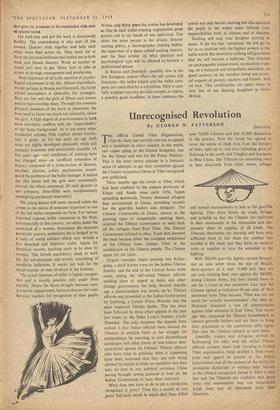Unrecognised Revolution
By GEORGE N. PATTERSON
Darjeeling
TrTI HE official United Tibet Organisation, Chul-Ka Sum, has recently sent out an appeal and a manifesto to every country in the world, two copies going to the United Kingdom, one for the Queen and one for the Prime Minister. This is the most recent episode in a fantastic series of attempts to get their revolution against the Chinese occupation forces in Tibet recognised and publicised.
Three months ago the revolt in Tibet, which had been confined to the eastern provinces of Kham and Amdo since early 1956, began spreading westwards. Twenty thousand refugees had accumulated in Lhasa, providing recruits for the guerrilla leaders and delegates. The Chinese Communists , in • Lhasa, uneasy at the growing signs of sympathetic uprising there, ordered the Tibetan Government to send back all the refugees from East Tibet. The Tibetan Government refused to obey. From that moment the issue became either the complete withdrawal of the Chinese from Greater Tibet or the annihilation •of the Tibetan people. The Chinese opted for the latter.
Urgent messages began pouring into Kalim- pong, a small border town on the Indian-Tibetan frontier and the end of the Central Asian trade route, asking the self-exiled Tibetan officials residing there to appeal to India and other foreign governments for help. Several months ago a memorandum was drawn up by Tibetan officials and presented to the Indian Government by Lukhang, a former Prime Minister and the most respected Tibetan leader. This has since been followed by three other appeals in the past few weeks by the Dalai Lama's brother, Gyalu Thondup. The only response the appeals have evoked is that Indian officials have advised the Tibetans to emulate India in her struggle for independence by resorting to civil disobedience campaigns and other forms of non-violent dem- onstrations against the Chinese. Tibetan officials who have tried to publicise what is happening have been reminded that they are only being allowed to remain in India on condition that they take no part in any political activities, China having brought strong pressure to bear on the Indian Government to have them returned.
What does one have to do to get a revolution recognised in print? Tibet has a record of two years' full-scale revolt in which they have killed over 50,000 Chinese and lost 15,000 themselves in the process. Now the revolt has spread to cover the whole of High Asia from the borders of India right up to, and even including, parts of Sinkiang in the north and Tsinghai and Szechuan in West China. The Tibetans are streaming away in their thousands from cities, towns, villages and nomad encampments to join in the guerrilla lighting. They have blown up roads, bridges and airfields so that the Chinese are restricted in their movements in the mountains and des- perately short of supplies of all kinds. The Tibetans themselves are starving and have only sufficient food to last them for another two months at the most, and they have no medical units or supplies to treat the wounded in the fighting.
With 200,000 guerrilla fighters spread through- out an area seven times the size of Britain, three-quarters of it over 15,000 feet, they are not only holding their own against the 300,000- strong Chinese Army, but have, forced them to ask for a truce on two occasions. Last year the Chinese agreed to withdraw 90 per cent. of their personnel from Tibet because 'Tibet was not yet ready for socialist reconstruction'—but then de- liberately launched a war of extermination against rebel elements in East Tibet. Two weeks ago they requested the Tibetan Government to contact guerrilla leaders and ask them to bring their grievances to the conference table again. This time the Tibetans refused to trust them.
Guerrilla leaders and delegates arrived in Kalimpong for talks with the exiled Tibetan officials resident there and, forming a United Tibet organisatibn, have drafted a final mani- festo and appeal to present to the Indian Government and all the nations of the world for immediate diplomatic or military help. Morale in the Chinese occupation forces in Tibet is very low and the Tibetans are confident that given arms and ammunition they can successfully finish their war of liberation from their liberators.


































 Previous page
Previous page